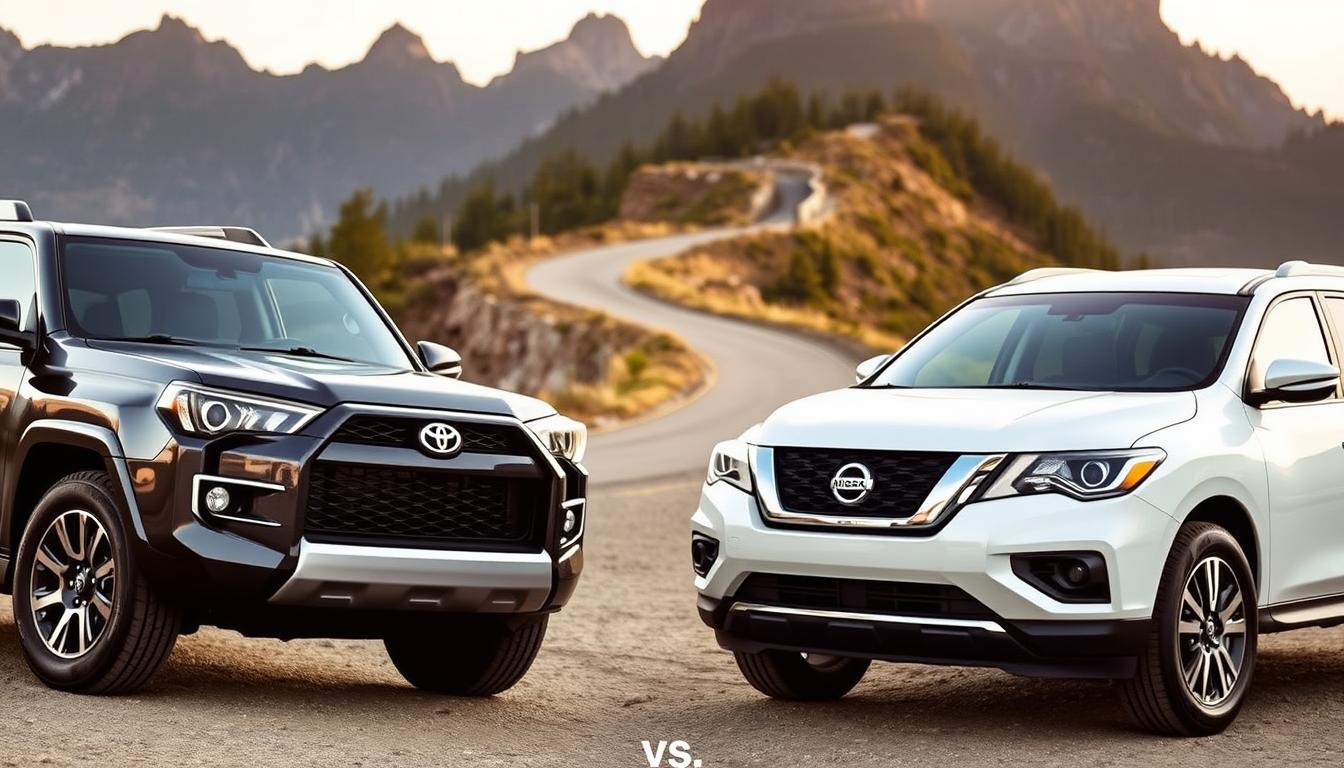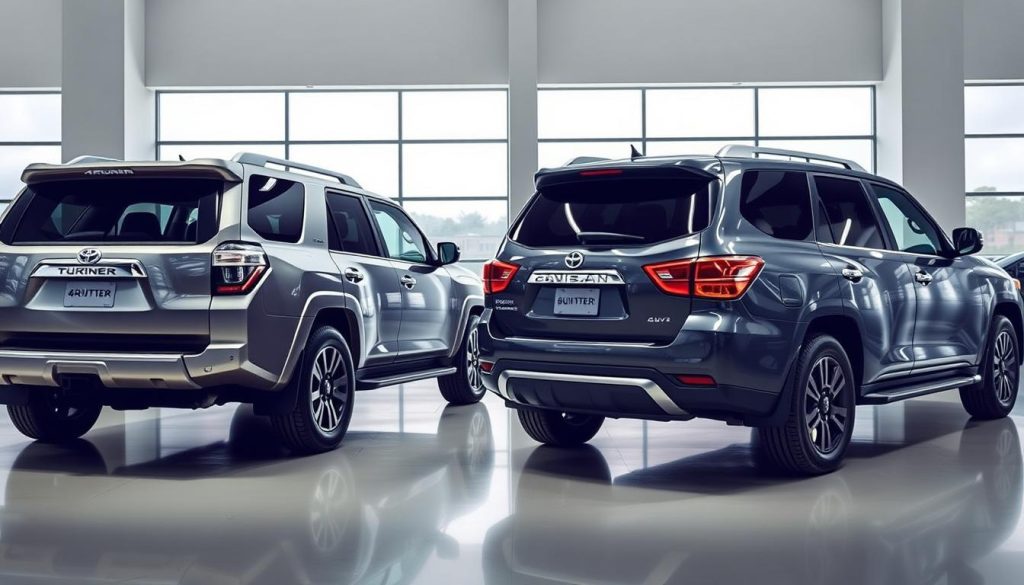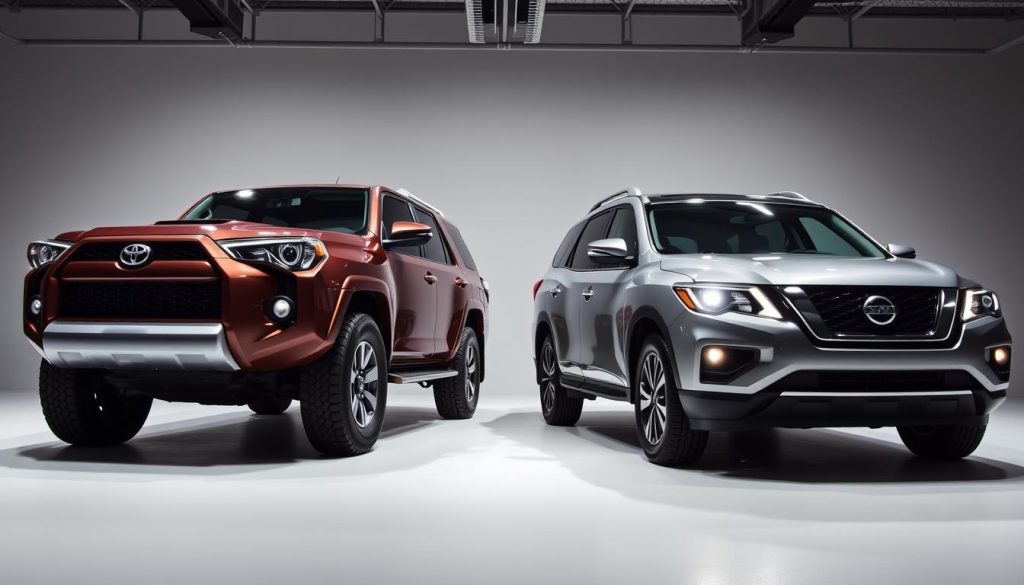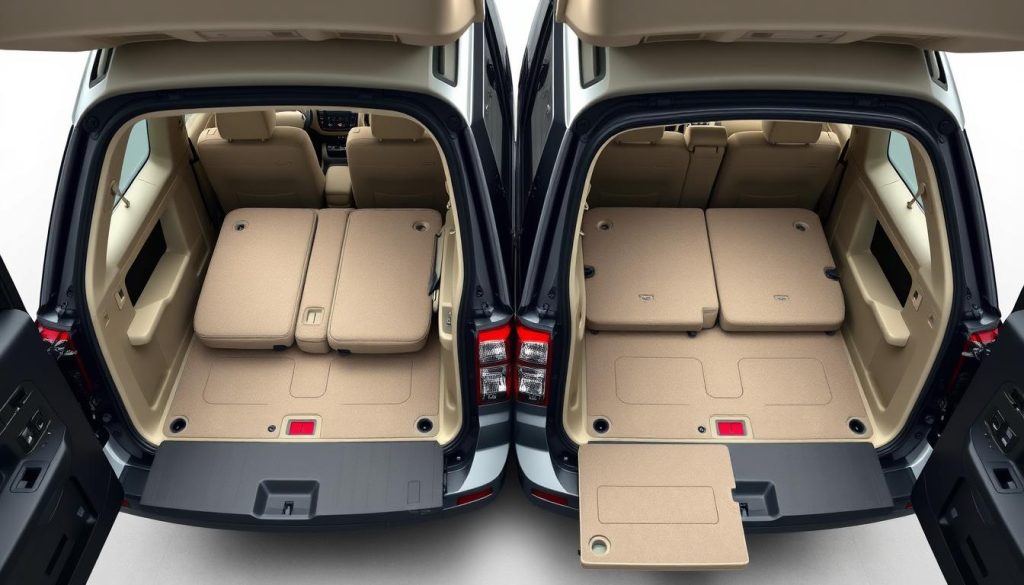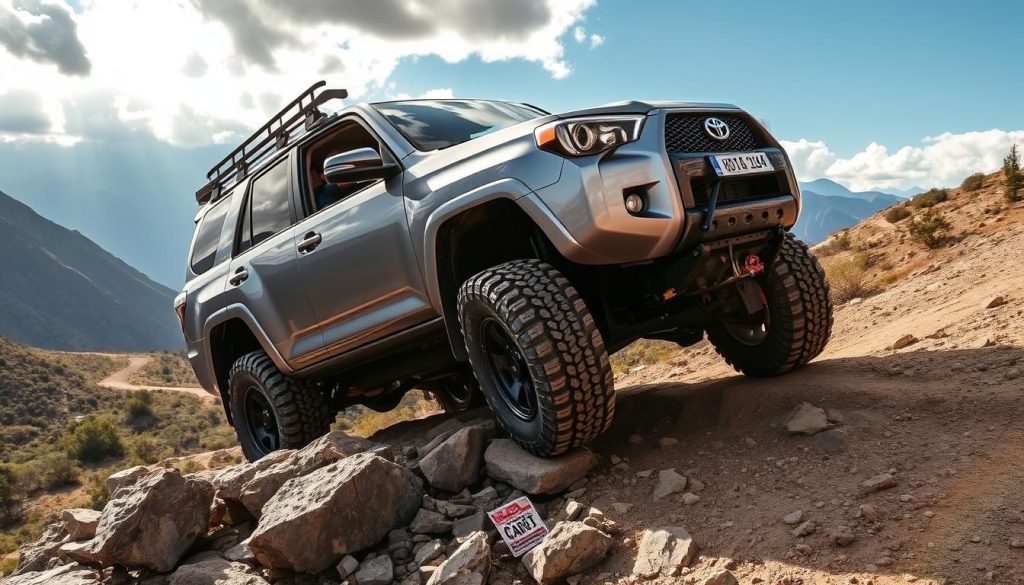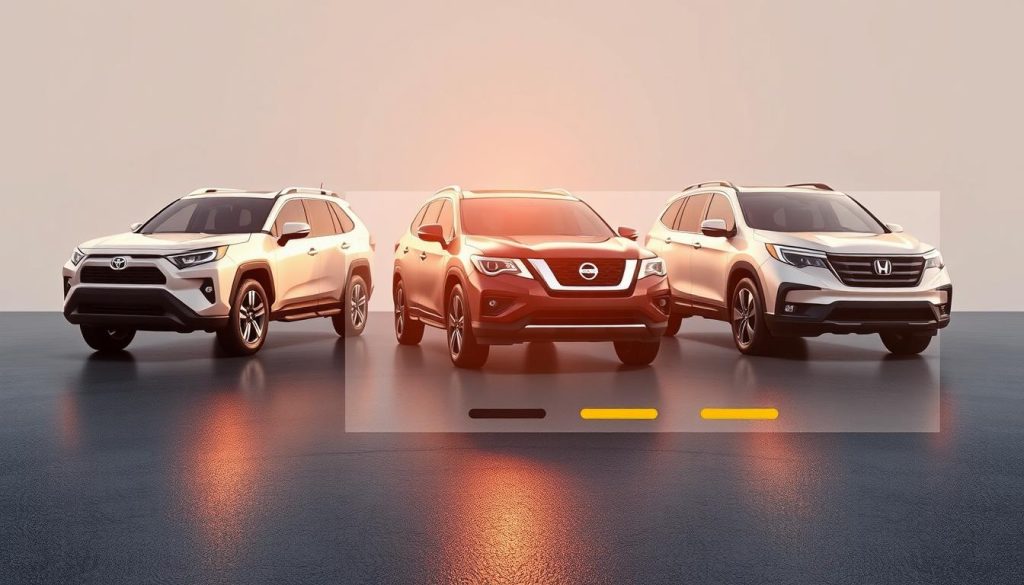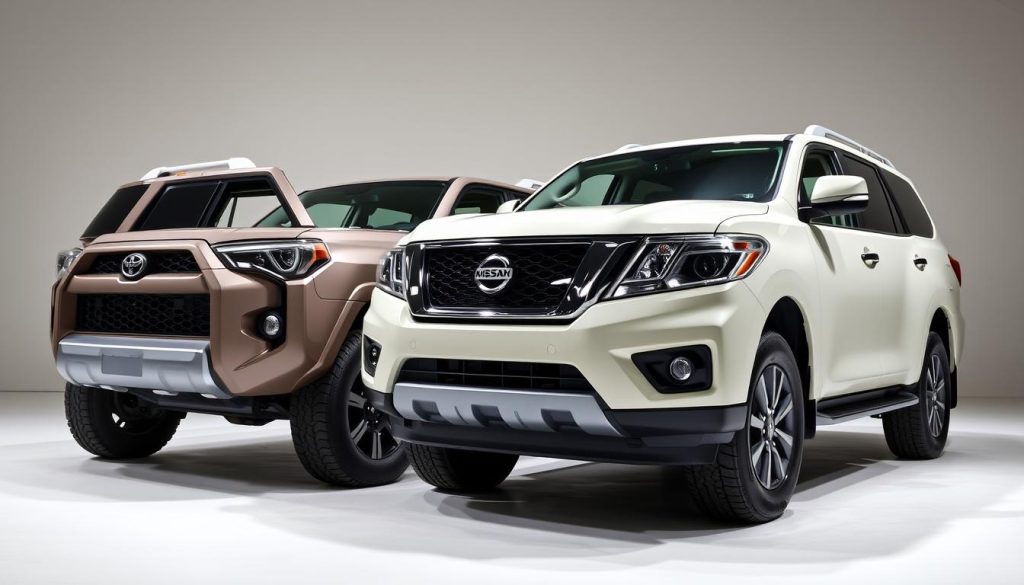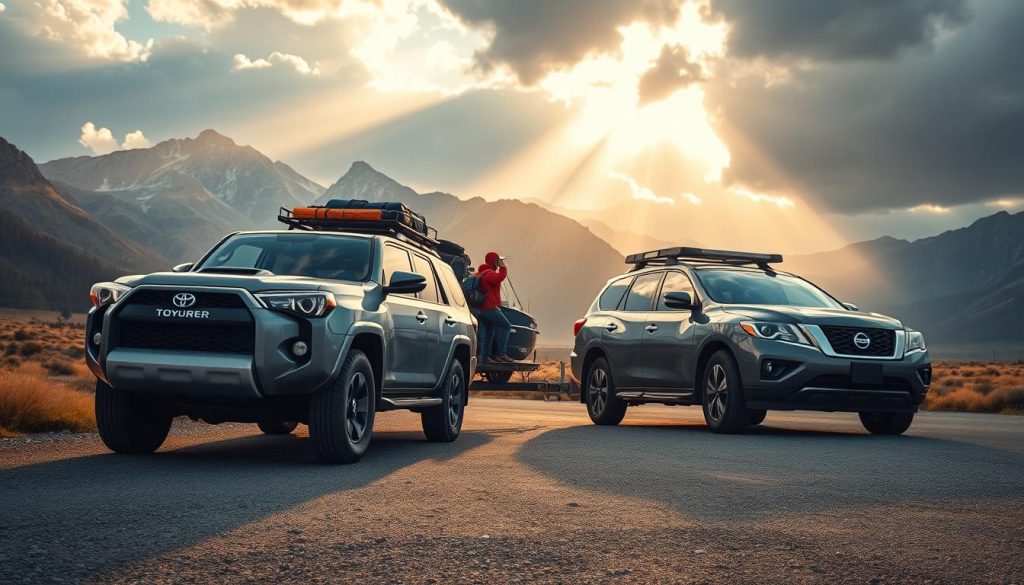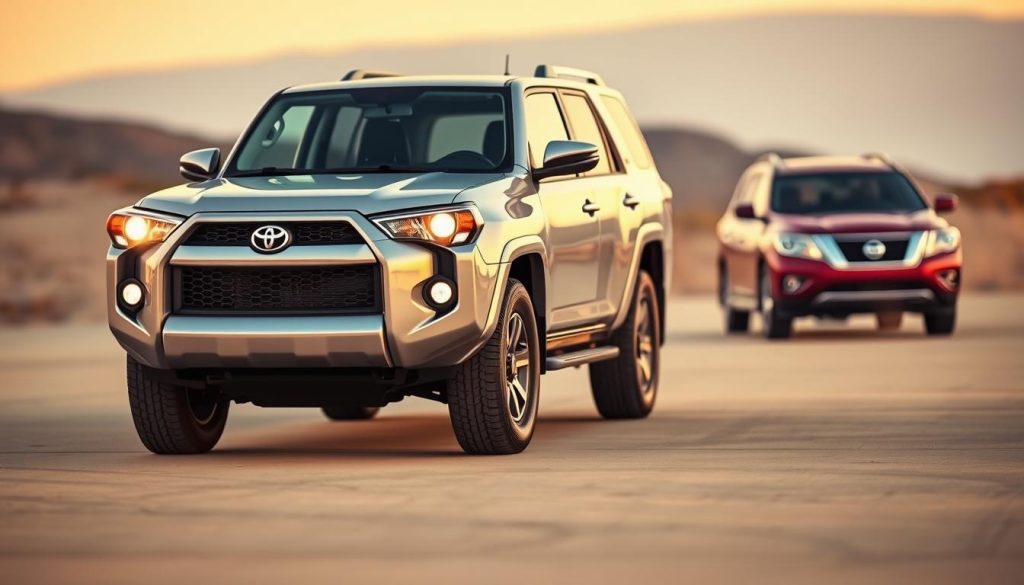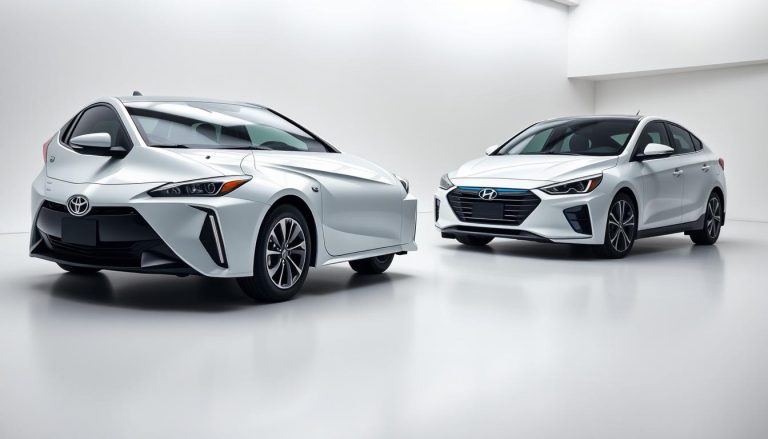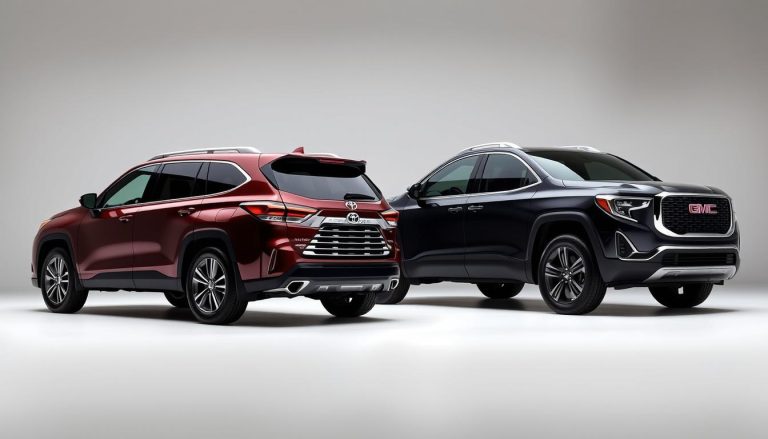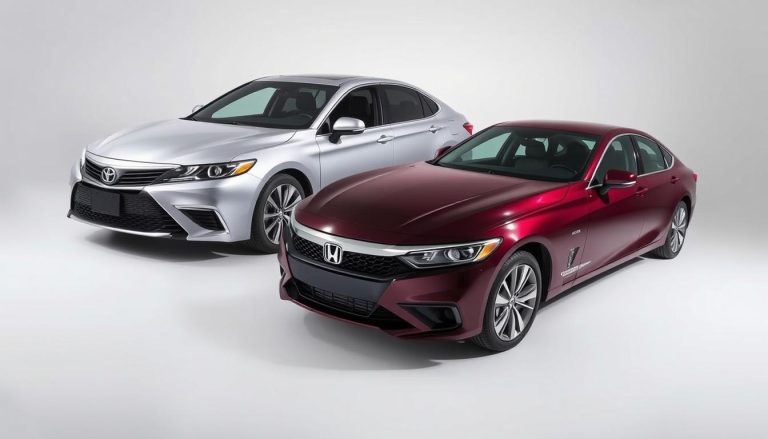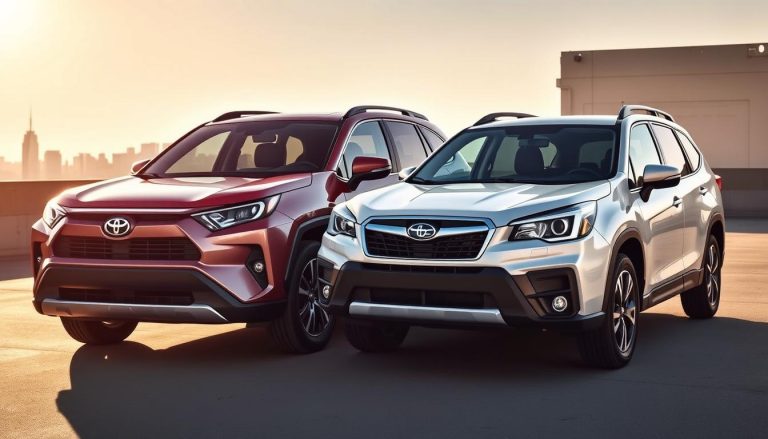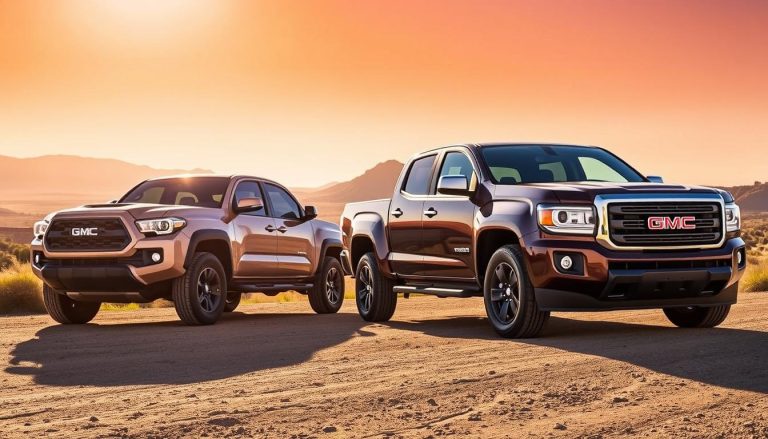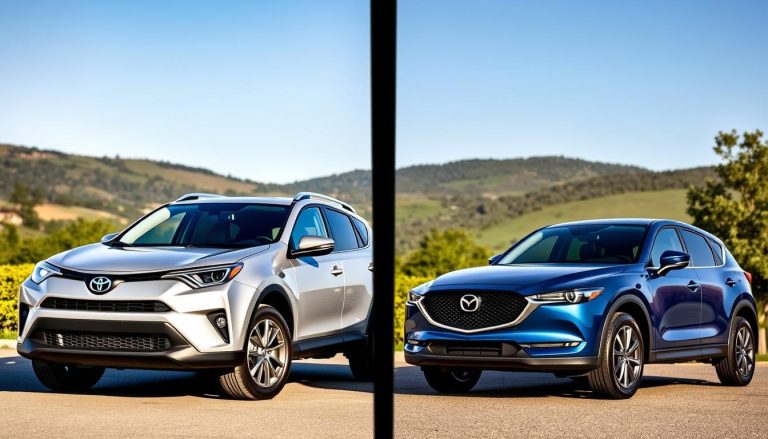Toyota 4Runner vs Pathfinder: Which SUV Is Right for You?
Looking for a midsize SUV can be tough with so many choices. The 2023 Toyota 4Runner and Nissan Pathfinder show two different ways to design an SUV. They appeal to different drivers and lifestyles.
The Toyota 4Runner is a rugged, truck-based SUV great for off-road adventures. It’s perfect for those who love the outdoors. On the other hand, the Nissan Pathfinder is a refined, family-friendly crossover. It offers smooth driving and is great for daily use.
Deciding between the 4Runner and Pathfinder depends on what you need. Do you want a vehicle for tough terrain, or something comfortable for daily life? Both SUVs have their own strengths in the midsize market.
This detailed comparison will cover all aspects of these popular SUVs. It aims to help you choose the right one for your driving needs and personal taste.
Introduction to Modern SUV Choices
The world of midsize SUVs has changed a lot in recent years. What were once tough, practical vehicles have turned into stylish family cars. They now offer both power and comfort.
Today, you can choose from two main types of SUVs: those built on truck platforms and those on crossover platforms. Each type affects how the vehicle drives and what it can do.
Evolution of SUV Design
Off-road SUVs started as strong, truck-like vehicles. They were built for tough tasks. They had:
- Body-on-frame construction
- High ground clearance
- Robust four-wheel-drive systems
- Minimal interior refinement
Truck-Based vs Crossover Platforms
Now, SUVs come in two main styles: traditional and modern.
| Platform Type | Strengths | Weaknesses |
|---|---|---|
| Truck-Based | Superior towing capacity | Lower fuel efficiency |
| Crossover | Better ride comfort | Limited off-road capabilities |
Market Positioning
Car makers now aim at different groups of buyers. They make SUVs that are good at performance, comfort, and practicality. The Toyota 4Runner is for those who love off-roading. The Nissan Pathfinder is for those who want a smooth ride.
Knowing about these design styles helps buyers pick the right SUV. It ensures the vehicle fits their driving style and needs.
Price Comparison and Value Proposition
When looking at midsize SUVs, price and value are key. The 2023 Nissan Pathfinder and Toyota 4Runner have different prices. This shows how they stand in the market.
The Pathfinder starts at $35,000. It comes with many standard features, making it a great choice for those on a budget. The 4Runner, starting at $39,555, is seen as a more premium option.
- Pathfinder Base Price: $35,000
- 4Runner Base Price: $39,555
- Price Difference: Approximately $4,500
Reliability is also important for long-term value. Toyota is known for making durable cars, which might make the 4Runner worth the extra cost. The Pathfinder, on the other hand, offers modern features at a lower price.
It’s not just about the price. Buyers should think about the total cost of owning a car. This includes:
- Initial purchase price
- Fuel efficiency
- Maintenance costs
- Potential resale value
Each SUV has its own unique value that goes beyond just price. The best choice depends on what you need, how you drive, and your budget.
4Runner vs Pathfinder: A Direct Comparison
When comparing the Toyota 4Runner and Nissan Pathfinder, buyers see two different SUVs. Each caters to different driver needs. These midsize SUVs offer unique strengths, making them appealing to various drivers.
The performance specs show clear differences between the Toyota 4Runner and Nissan Pathfinder. Let’s look at their main features:
Performance Specifications
- Toyota 4Runner: 270-hp 4.0-liter V6 engine
- Nissan Pathfinder: 284-hp V6 engine
- 4Runner transmission: 5-speed automatic
- Pathfinder transmission: 9-speed automatic
Standard Features
Both SUVs have impressive standard features that make driving better:
- Toyota 4Runner standard features:
- Rugged off-road capability
- Durable body-on-frame construction
- Advanced safety technologies
- Nissan Pathfinder standard features:
- Smooth on-road performance
- Comfortable crossover design
- Modern infotainment system
Available Trim Levels
The 4Runner vs Pathfinder comparison also looks at their trim options. Toyota 4Runner has trims from SR5 to TRD Pro for off-road fans. Nissan Pathfinder offers trims like SL and Platinum for luxury.
Choosing between the Toyota 4Runner and Nissan Pathfinder depends on what you need. The 4Runner is for adventure lovers. The Pathfinder is for families wanting comfort and versatility.
Exterior Design and Styling
The Toyota 4Runner and Nissan Pathfinder have different looks. Each model shows its own style, fitting its purpose and audience.
The Toyota 4Runner looks tough and ready for adventure. It has a strong, boxy shape with:
- Vertical front grille with aggressive stance
- Protective lower body cladding
- High ground clearance for off-road capability
- Muscular wheel arches that emphasize durability
Nissan Pathfinder has a modern look. Its latest design includes:
- Sleek, aerodynamic body lines
- Modern LED lighting design
- Smoother contours that balance urban sophistication
- Refined profile appealing to family-oriented drivers
Color choices are key to each SUV’s look. The Toyota 4Runner has bold colors like Midnight Black Pearl and Army Green. The Nissan Pathfinder offers elegant shades such as Scarlet Ember and Brilliant Silver.
Wheels also set these SUVs apart. The 4Runner has rugged, all-terrain wheels. The Pathfinder has refined, road-focused wheels that match its urban vibe.
Interior Comfort and Technology
When we look at the Toyota 4Runner and Nissan Pathfinder, we see how important interior space and tech are. Both SUVs have their own ways of making the cabin comfortable. They meet different needs and tastes.
Infotainment Systems
The Pathfinder leads in infotainment tech. Its top models have a big 9-inch touchscreen. It shows clear images and is easy to use. It has:
- Wireless Apple CarPlay and Android Auto
- Advanced navigation systems
- Multiple device connectivity options
Cabin Materials and Quality
The interior quality is different between these SUVs. The Pathfinder is more upscale, with premium soft-touch materials. It feels like a luxury car, with:
- Leather-appointed seating
- Sophisticated trim options
- Noise-reducing interior design
Storage Solutions
Storage is key for SUV buyers. Both vehicles have smart storage, but the Pathfinder has more options. You’ll find:
- Configurable center console
- Multiple charging ports
- Flexible cargo management systems
The safety features in the interior tech make driving safer. They give drivers confidence and peace of mind.
Passenger Space and Cargo Capacity
In this midsize SUV comparison, the Toyota 4Runner and Nissan Pathfinder stand out. They offer different passenger spaces for various family needs. The seating setup is key for daily use and family trips.
The Pathfinder has a more flexible third-row seat, fitting up to three people in all trims. On the other hand, the 4Runner’s third-row is only on certain models and seats two.
- Pathfinder Cargo Capacity:
- 45.0 cubic feet behind second row
- 80.5 cubic feet behind front seats
- 4Runner Cargo Capacity:
- 47.2 cubic feet behind second row
- 89.7 cubic feet behind front seats
For those needing lots of space, the 4Runner has a slight edge. It offers more room for luggage, sports gear, or weekend stuff. Buyers should think about their space needs when choosing between these SUVs.
Space isn’t just about numbers—it’s about how the interior works for your lifestyle.
Comfort is more than just space. Both SUVs have designs that focus on headroom, legroom, and overall comfort. These features are important, even if they’re not just about cubic feet.
Performance and Driving Dynamics
The Toyota 4Runner and Nissan Pathfinder show different ways to handle performance and driving. Each car gives a unique feel that meets different driver needs.
Engine Specifications
The Toyota 4Runner has a strong 4.0-liter V6 engine, making 270 horsepower. The Nissan Pathfinder has a more modern engine. Here’s a look at their main specs:
| Feature | Toyota 4Runner | Nissan Pathfinder |
|---|---|---|
| Engine Type | 4.0L V6 | 3.5L V6 |
| Horsepower | 270 hp | 284 hp |
| Torque | 278 lb-ft | 259 lb-ft |
Transmission Options
Transmission tech is a big difference between these SUVs. The Toyota 4Runner sticks with a five-speed automatic. The Nissan Pathfinder has a nine-speed automatic.
- Toyota 4Runner: 5-speed automatic transmission
- Nissan Pathfinder: 9-speed automatic transmission
Handling Characteristics
The way these SUVs drive is quite different. The Toyota 4Runner is more like a truck, great for off-road adventures. The Nissan Pathfinder is smoother, better for city driving.
“Performance isn’t just about power—it’s about how the vehicle makes you feel behind the wheel.” – Automotive Expert
If you want a tough, off-road-ready SUV, the Toyota 4Runner is for you. For a smoother, daily drive, the Nissan Pathfinder might be better.
Off-Road Capabilities and Features
The Toyota 4Runner is a top pick for off-road adventures. It’s known for its rugged performance. This vehicle stands out with its off-road skills, making it a favorite among SUV fans.
The Toyota 4Runner has many off-road technologies. These features help it handle tough terrains:
- Two-speed transfer case for better traction
- Locking rear differential for more grip
- Selectable off-road driving modes
- Crawl Control for slow, precise moves
- Automatic suspension sway bar disconnect system
Compared to the Nissan Pathfinder, the Toyota 4Runner has more off-road features. While the Pathfinder has modes for sand and mud, the 4Runner offers a full off-road package. This makes it perfect for those who love adventure.
The Toyota 4Runner has great ground clearance and approach angles. Its strong build and advanced systems let drivers tackle tough landscapes with confidence.
The Toyota 4Runner isn’t just an SUV—it’s a trail-conquering machine built for those who demand exceptional off-road performance.
Fuel Economy and Efficiency Ratings
Fuel efficiency is key when choosing a midsize SUV. It matters for those who watch their budget and care about the environment. The Toyota 4Runner and Nissan Pathfinder show different ways to save on fuel, affecting your costs over time.
The fuel efficiency of these SUVs is quite different. Each model aims to meet different needs. The Pathfinder uses new tech to get better gas mileage.
City and Highway MPG Breakdown
Here are the fuel economy ratings for both SUVs:
| Vehicle | City MPG | Highway MPG | Combined MPG |
|---|---|---|---|
| Toyota 4Runner | 16 | 19 | 17 |
| Nissan Pathfinder | 21 | 27 | 23 |
Real-World Fuel Consumption
Official ratings are a good start, but real-world use can differ. Several things affect how much fuel you use:
- Driving conditions
- Terrain type
- Vehicle load
- Driving style
The Pathfinder shines on long drives. Its design and engine help it use less fuel. This makes it stand out in the midsize SUV market.
Safety Features and Crash Test Ratings
Safety is key when picking an SUV. The Toyota 4Runner and Nissan Pathfinder have different ways to keep you safe. Each has special safety features to protect drivers and passengers.
The Nissan Pathfinder shines in crash tests, getting top marks from the NHTSA and IIHS. It has advanced safety tech to keep families safe.
- Pathfinder Safety Features:
- Automatic Emergency Braking
- Blind Spot Warning
- Rear Cross Traffic Alert
- Lane Departure Warning
- Toyota 4Runner Safety Highlights:
- Standard Toyota Safety Sense
- Pre-Collision System
- Dynamic Radar Cruise Control
- Lane Departure Alert
The Toyota 4Runner got a Marginal score for small-overlap frontal impacts. This is something to think about. The 4Runner has strong safety tech, but the Pathfinder does better in crash tests.
If you want the safest ride, the Nissan Pathfinder might be the best choice. It has more safety features and does better in crash tests. It’s a great pick for families who value safety.
Towing Capacity and Utility
The Nissan Pathfinder and Toyota 4Runner have different strengths for SUV fans. The Pathfinder can tow up to 6,000 pounds, beating the 4Runner’s 5,000-pound limit. This is important for those who tow trailers, boats, or heavy equipment.
Several factors affect towing capacity. These include engine power, transmission, chassis strength, and trailer brakes. Buyers should think about these when choosing a vehicle.
- Engine power and torque
- Transmission design
- Chassis strength
- Trailer brake systems
The Toyota 4Runner is built for towing, thanks to its truck-based design. Its body-on-frame construction makes it durable. The Nissan Pathfinder, a crossover, offers smooth handling and strong towing power.
| SUV Model | Max Towing Capacity | Recommended Uses |
|---|---|---|
| Toyota 4Runner | 5,000 lbs | Camping trailers, small boats |
| Nissan Pathfinder | 6,000 lbs | Larger boats, travel trailers |
Both SUVs have useful features. The 4Runner has strong roof racks and tie-downs. The Pathfinder has underfloor storage. Buyers should think about their needs to choose the right SUV.
Reliability and Resale Value
When you buy an SUV, knowing about long-term reliability and resale value is key. The Toyota 4Runner and Nissan Pathfinder stand out in the SUV market. They each have their own strengths in reliability ratings.
Maintenance Cost Insights
Reliability ratings affect how much you spend on your SUV. The Toyota 4Runner is known for its durability. It often needs little maintenance compared to others. Nissan Pathfinder owners might spend about $500-$700 a year on maintenance.
- Toyota 4Runner average annual maintenance: $441
- Nissan Pathfinder average annual maintenance: $542
- Potential long-term savings with Toyota 4Runner
Resale Value Considerations
Resale value is important for SUV buyers. The Toyota 4Runner keeps about 60% of its value after five years. Nissan Pathfinder holds around 50% of its original value in the same time.
| SUV Model | 5-Year Value Retention | Estimated Depreciation |
|---|---|---|
| Toyota 4Runner | 60% | 40% |
| Nissan Pathfinder | 50% | 50% |
“Reliability isn’t just about initial quality, but sustained performance over time.” – Automotive Experts
Both SUVs offer great long-term benefits. The Toyota 4Runner is known for its reliability. It’s a good choice for those who want low maintenance and strong resale value.
Conclusion
When comparing the Toyota 4Runner and Nissan Pathfinder, buyers face a nuanced decision. Our midsize SUV comparison shows two distinct vehicles. The 4Runner is great for off-road adventures, while the Pathfinder is better for family trips.
The 4Runner is known for its durability and off-road skills. It’s perfect for outdoor lovers who need a tough vehicle. On the other hand, the Pathfinder offers a smoother ride and modern tech. It’s ideal for city and suburban driving.
Choosing between these SUVs depends on what you need. If you want to tackle tough terrain, the 4Runner is the way to go. But if you’re looking for a practical family vehicle, the Pathfinder is a better choice. Both are solid options in the SUV market, meeting different needs.
Before making a decision, think about your driving needs, budget, and future plans. Test driving both SUVs will help you decide which one fits your lifestyle and driving habits best.
FAQ
What are the main differences between the Toyota 4Runner and Nissan Pathfinder?
The Toyota 4Runner is a rugged, truck-based SUV great for off-road adventures. The Nissan Pathfinder is a crossover SUV that’s better for smooth on-road drives and family comfort. The 4Runner has traditional SUV traits, while the Pathfinder offers a modern, car-like feel.
Which SUV is better for off-road driving?
The Toyota 4Runner excels in off-road driving. It has a strong four-wheel-drive system, high ground clearance, and special off-road tech. The Nissan Pathfinder is better for light off-road use and is mainly designed for driving on roads.
How do the fuel efficiency ratings compare between the two SUVs?
The Nissan Pathfinder usually gets better gas mileage than the Toyota 4Runner. The 4Runner’s truck design and powerful engine lead to lower MPG ratings. The Pathfinder’s crossover design makes it more fuel-efficient, mainly in city and highway driving.
Which SUV offers more cargo space?
The Nissan Pathfinder has more cargo space and a flexible interior. It offers better passenger room and easy access to the third row. The Toyota 4Runner has a durable cargo area but is slightly less spacious than the Pathfinder.
What are the towing capacities of these SUVs?
The Nissan Pathfinder can tow up to 6,000 pounds, while the Toyota 4Runner can tow about 5,000 pounds. Yet, the 4Runner’s sturdy build might offer better towing stability in tough conditions.
Which SUV has better reliability ratings?
The Toyota 4Runner is known for its exceptional reliability and long-term durability. Its traditional design and Toyota’s reputation for building lasting vehicles give it an edge over the Nissan Pathfinder.
What is the price range for these SUVs?
The Toyota 4Runner starts at around ,000 to ,000. The Nissan Pathfinder is more affordable, starting at ,000 to ,000, depending on the trim and options.
Are these SUVs good for families?
The Nissan Pathfinder is more family-friendly, with a smoother ride and more comfort. The Toyota 4Runner is better for adventurous families who value durability and off-road skills over comfort.
Which SUV offers more advanced safety features?
The Nissan Pathfinder has more advanced safety tech, including modern driver assistance systems. The 4Runner has basic safety features but lags behind in cutting-edge safety innovations.
How do the interior technologies compare?
The Nissan Pathfinder has a modern infotainment system with large touchscreens and advanced connectivity. The Toyota 4Runner focuses on durability and functionality, with a more basic interior tech setup.

